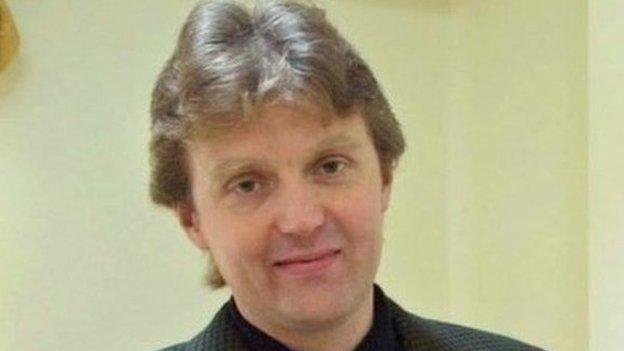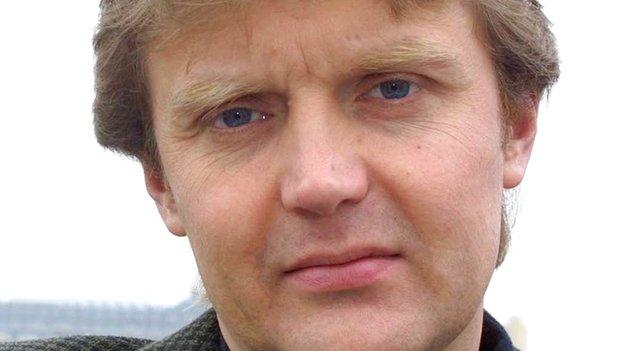Litvinenko inquiry: Key suspect may not give evidence
- Published

Dmitri Kovtun has been named as a key suspect in the death of Alexander Litvinenko
A prime suspect in the killing of Alexander Litvinenko has cast doubt on whether he will give evidence to the public inquiry into the spy's death.
Dmitri Kovtun believed he may be committing an offence under Russian law if he gave evidence, the hearing heard.
His earlier request to give evidence may have been to "obtain information", said a lawyer for the Met police.
Mr Kovtun denies any involvement in the death of Mr Litvinenko, who died of radioactive poisoning in November 2006.
The Russian, who has "core participant status" to the inquiry at London's Royal Courts of Justice, had been due to provide testimony by video link from Moscow starting on Monday.
However, on Friday, the court heard Mr Kovtun had emailed to say he felt bound by obligations of confidentiality to the Russian investigation, which still continued.
'No surprise'
Robin Tam QC, counsel to the inquiry, said Mr Kovtun had been directed to his Russian lawyer, and given a deadline of noon on Monday to decide whether to take part.
"There's a very strong argument for saying they've had far too much time already," he said.
Richard Horwell QC, for the Metropolitan Police, said Mr Kovtun's actions did not come as "any surprise",
"It appears Kovtun's request to give evidence was nothing more than an attempt to become a core participant and obtain as much information about these proceedings as he could.
"There's a certain inevitability about what will happen on Monday, and bookmakers' books will be closed."

Mr Litvinenko died three weeks after drinking tea laced with polonium-210
However, Mr Horwell added that if Mr Kovtun was not given the opportunity to give evidence, "the Russian authorities will blame your withdrawal of the video link".
A lawyer for Mr Litvinenko's widow claimed Mr Kovtun's actions implied he was guilty of her husband's murder, along with his co-accused Andrei Lugovoi. Mr Lugovoi also denies involvement.
'Expensive poison'
Earlier on Friday, the inquiry heard that Mr Kovtun had asked a former friend if he knew a London chef who could administer "expensive poison" to "traitor" Mr Litvinenko.
The witness - known only as D3 - said he had worked with Mr Kovtun in a restaurant in Hamburg, Germany, and made the allegations during interviews with German police in 2006 following Mr Litvinenko's death.
D3 declined to give evidence to the inquiry, but his interview was read out.
The inquiry heard how he did not mention the alleged conversation when he was first questioned by police, but said he did so afterwards because he was frightened.
He told police Mr Kovtun had called him after Mr Litvinenko's death, saying reports linking him to the killing were "just rubbish".
Mr Litvinenko - who was a former officer with the Federal Security Service, the successor to the KGB - died after fleeing to Britain where he became a UK citizen and was a fierce critic of the Kremlin.
He died nearly three weeks after consuming tea laced with polonium-210 at a London hotel.
Mr Kovtun and Andrei Lugovoi remain in Russia, despite requests for them to be extradited to the UK.

The Litvinenko case
23 Nov 2006 - Mr Litvinenko dies three weeks after having tea with former agents Andrei Lugovoi and Dmitri Kovtun in London
24 Nov 2006 - His death is attributed to polonium-210
22 May 2007 - Britain's director of public prosecutions decides Mr Lugovoi should be charged with the murder of Mr Litvinenko
31 May 2007 - Mr Lugovoi denies any involvement in his death but says Mr Litvinenko was a British spy
5 Jul 2007 - Russia officially refuses to extradite Mr Lugovoi, saying its constitution does not allow it
May-June 2013 - Inquest into Mr Litvinenko's death delayed as coroner decides a public inquiry would be preferable, as it would be able to hear some evidence in secret
July 2013 - Ministers rule out public inquiry
Jan 2014 - Marina Litvinenko in High Court fight to force a public inquiry
11 Feb 2014 - High Court says the Home Office had been wrong to rule out an inquiry before the outcome of an inquest
July 2014 - Public inquiry announced by Home Office

- Published15 June 2015

- Published30 March 2015

- Published21 January 2016
